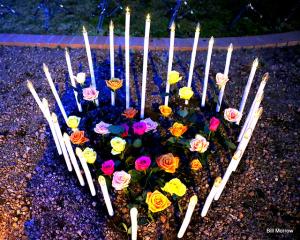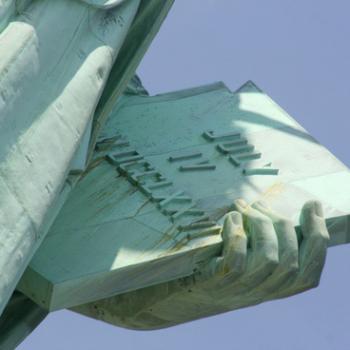Killers Without Conscience: Something Old and Something New

Make it stop! It is self-evident that the United States has a unique problem of civilian mass shootings because we uniquely give civilians access to military-grade weapons, and it is well past time lawmakers fix this deadly anomaly. But why are these massacres occurring with crushing and accelerating frequency, when these problematic laws have been in place for many years? And throughout the world it seems as if massacres unrelated to war are increasingly common, whether the killers use guns or bombs or trucks or any other means. I can’t help but perceive not simply “lone wolves” without consciences, but a spreading evil spirit animating these murderous acts. But lest anyone mistake that I am saying “the devil made them do it,” I need to explain what I mean by conscience, and how that is connected to spirit.
“Conscience” in its literal etymological sense means a shared knowledge. It is not the same thing as conviction, that is, a belief that has decisively conquered competing ideas that an individual might hold. Conscience cannot exist in isolation, though we often tend to think of it that way. It is belief about what is right and wrong that arises from being shared, but with whom?
The Christian answer is knowledge shared between the Holy Spirit and the believer. “The Advocate, the Holy Spirit, whom the Father will send in my name, will teach you everything, and remind you of all that I have said to you,” Jesus assured us. (John 14:26) Moral truth is an essential part of God’s nature, part of the imago Dei that humanity shares, and conscience is the individual’s perception of that shared knowledge. The Catholic Catechism (1778-1779) also explains:
Conscience is a judgment of reason whereby the human person recognizes the moral quality of a concrete act that he is going to perform, is in the process of performing, or has already completed. In all he says and does, man is obliged to follow faithfully what he knows to be just and right. It is by the judgment of his conscience that man perceives and recognizes the prescriptions of the divine law:
“Conscience is a law of the mind; yet [Christians] would not grant that it is nothing more; I mean that it was not a dictate, nor conveyed the notion of responsibility, of duty, of a threat and a promise…. [Conscience] is a messenger of him, who, both in nature and in grace, speaks to us behind a veil, and teaches and rules us by his representatives. Conscience is the aboriginal Vicar of Christ.” (Bl. John Henry Cardinal Newman, “Letter to the Duke of Norfolk”)
It is important for every person to be sufficiently present to himself in order to hear and follow the voice of his conscience. This requirement of interiority is all the more necessary as life often distracts us from any reflection, self-examination or introspection:
“Return to your conscience, question it….Turn inward, brethren, and in everything you do, see God as your witness.” (St. Augustine, In ep Jo. 8,9)
The sure teachings of the Holy Spirit are always available to our mind if we but humbly ask and listen for them, but not everyone is aware of this. Without awareness of this gift of the Spirit and regular efforts to perceive it, our minds look for guidance and assurance by attaching to the knowledge of others. A dysfunctional and even evil conscience can develop when people join their minds to false sources of “knowledge” about right and wrong.
Too often I hear people blame murder and other heinous acts on a broad collective such as “secular society.” It is important to understand that a destructive ideological mindset need not be shared by a majority of the polis or even large numbers of people in order to work damage on its followers, but it must be cohesive and comprehensive among them. It must become the lens through which they view all moral dilemmas. Even just two or three people sharing and reinforcing a toxic groupthink can ferment evil convictions and intentions. Cults have power not so much according to their size, but based on their access to persons who do not search their God-given understanding of justice to discover truth, but rather look to external sources of teaching and affirmation to construct their sense of order.
External teachers and group dynamics do not always lead in a bad direction. A person with the “right” teachers and friends can acquire a well-functioning rule of life for themselves. But they are not thereby developing a proper conscience. If they have not practiced interiority and learned to listen to the Spirit over external authorities, they remain vulnerable to falling into the hands of the wrong authorities, particularly if their social support system becomes disrupted, or promised rewards for good behavior fail to materialize.
Any time people join their minds together without placing shared knowledge with the Divine Spirit as their focal point, I refer to their collective beliefs and wills as a small-s spirit. (Those uncomfortable with the mystical language might call it ideology.) Cross-cutting extrinsic groupings such as religious confessions, ethnicities, class, and the like, we can discern spirits as diverse as elitism, nationalism, pacifism, traditionalism, nihilism, materialism (capitalistic or dialectical), sexism, relativism, and racism, just to name a few that wreak havoc on society today. When a person allows an evil spirit to direct their thoughts and actions, they become complicit in their own corruption. It can be very difficult to break free from such spirits, and it requires having a better conscience to attach to. A person swept clean of evil spirits who does not replace them with the Holy Spirit will often end up in even worse shape. (Cf. Luke 11:24-26)
We seem to have a worldwide epidemic of people who are completely disconnected from their interior conscience, and held in the thrall of one (or more?) of these spirits of alternative conscience. Some of them were never encouraged to ponder questions of right and wrong in the first place. Others were given a schema of proper behavior by authoritarian means, masking their lack of conscience formation until they have succumbed to destructive groupthink.
Some people blame the epidemic on lack of order and moral formation in postmodern society, ignoring the fact that empty shells of traditional authoritarian constructions of conscience have basically the same consequence. Then they act shocked when young men “from good homes” turn into killers. (Young women rarely become murderers, but they too can get swept up in these evil spirits. They just tend to be more destructive of self and/or psyche, often enabling the men who justify violence more than actively participating with them.) But movements such as the “Alt-Right” lure young people in from overly-permissive and authoritarian households alike.
What IS new today is the ease of connecting with cultish communities, thanks to social media. It takes very little for disaffected young people to slip down a rabbit hole of hateful ideology, latch on to mendacious gurus, and find hundreds of affirming compatriots. Combined with lax gun regulations in the United States and we now have a volatile stew that explodes with deadly regularity.
But deadly groupthink isn’t new. It just used to take more obviously collectivist forms, whereas today we find ways to deceive ourselves that the killers are merely lone wolves, or “mentally ill.” Arguably the worst murderous spirit in the history of the world was Nazism, in which tens of millions of people became convinced that it was righteous to dominate and even exterminate millions of other people to forge a “pure” master race. Even totalitarian Communism, which caused the premature deaths of even more people than Nazis, never held the same widespread sway over the conscience of a people, but rather imposed the will of a minority over many by sheer force and fear. The complicity of many Europeans in the Holocaust, including many who considered themselves practicing Christians, is a fearsome phenomenon to behold.















